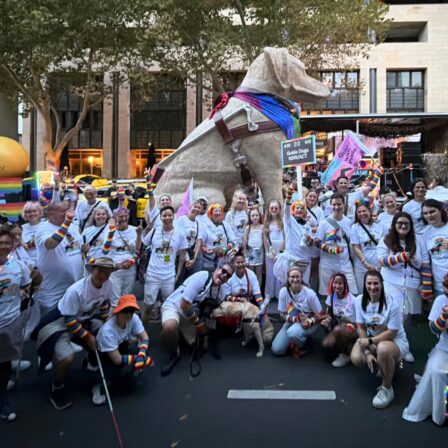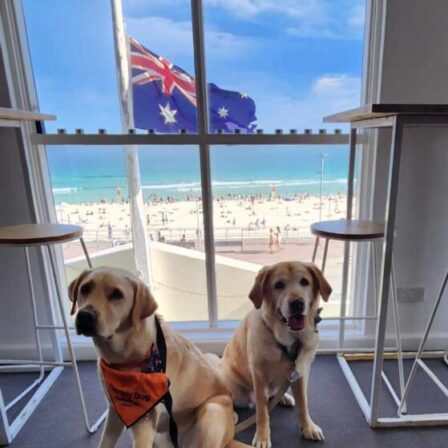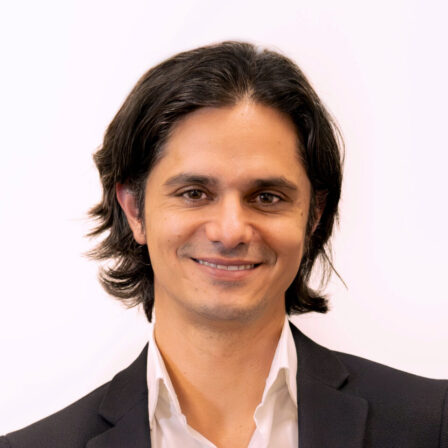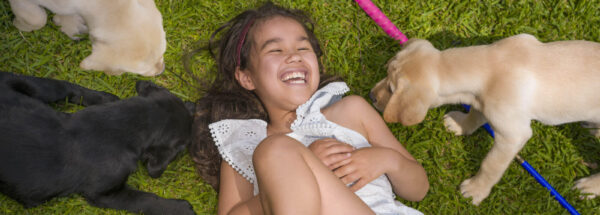News
From a small town to statewide advocacy.
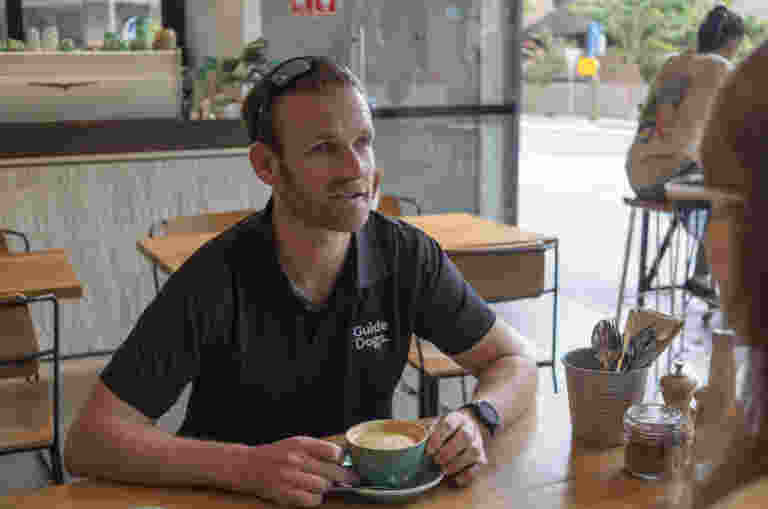
Dan grew up on a dairy farm in Barham, a small town three hours west of Albury. The middle of three boys, he had an active childhood—until a rapid change in his vision led to a diagnosis of Leber’s Optic Neuropathy.
By 16, he could no longer play sports or get his learner’s permit. School was also challenging in a time before laptops and assistive technology were the norm, and Dan initially resisted using a cane, not wanting to stand out. But after realising he couldn’t finish school to the high standards he had set himself, Dan sought help, learnt Braille and screen-reading software, and completed Year 12 over two years. In 2007, he gained early entry into physiotherapy at Charles Sturt University, which was the same year he met his first Guide Dog, Bear.
When the idea of a Guide Dog was first raised, Dan worried that someone more in need might miss out, and he admits it wasn’t smooth sailing with Bear in the beginning.
“I grew up with dogs, love dogs, but it’s still completely different to suddenly trusting a dog that you’re telling it to find something and start walking… Even so, I would reassure people that the reward that comes once you get past that is well and truly worth it,” Dan says.
“The relationship you build and the trust you build with your dog is incredible and just gives you so much more confidence in mobilising out and about in the community safely and independently.”
Of his very special relationship with his Guide Dog Bear, Dan says, “I don’t have the words to express how much he meant to me. Bear gave me a life, and he was my life. Without Bear, I don’t think I could have pushed myself so much. It gave me confidence knowing I had him supporting every step.”
After university, Dan worked as a physio for over 12 years. Starting in private practice treating people with sports injuries, he went on to treat patients with chronic pain and also worked in an acute mental health ward running a pain education program. Dan empathised with the impact of pain and what it takes away from a person’s identity. “I could relate to that. Suddenly losing all the things that were important to you, like for me, suddenly losing my connection to sport and having friends who didn’t know what to do.”
Given his own personal experiences and his empathy for others, Dan got involved in various committees, enjoying volunteering and giving back to others. During this time, he also worked as a Lived Experience Presenter with Guide Dogs NSW/ACT for 16 years, giving talks at schools, including his own, and training Rex Airlines workers on accessibility and inclusion for Guide Dog Handlers.
Now in his thirties and working as a Community Mobiliser with Guide Dogs NSW/ACT’s Social Change Team, Dan has stepped further into advocacy—a space that aligns with his professional skills, lived experience and passion.
Flights, Frodo and fine art: Life with Guide Dog Quinlan.
This brings us to three-year-old Quinlan, Dan’s third Guide Dog, who he started working with last year at the same time as starting his new job. “In terms of transitioning to a new dog, it couldn’t have been easier. He is so easy to please.”
Quinlan has proven to be the ideal companion, supporting Dan’s busy work and personal life both in Albury and when he travels to Guide Dogs headquarters in St Leonards, Sydney.
Dan and Quinlan are frequent flyers between Albury and Sydney, with Quinlan expertly curling up so small that fellow plane passengers often don’t realise he’s there. Quinlan also remembers his way around St Leonards, even after months away.
“I find I’m so confident in what he’s doing that my mind wanders, and I’m thinking about the meetings that I’ve got coming up or what I’m going to have for lunch,” says Dan.
Back home in Albury, Quinlan is not the only dog in the house; there’s also Dan’s retired Guide Dog, Frodo. At age 11, Frodo is very happy to relax all day. Both dogs are different but have bonded well and like to play together. Frodo loves a game of tug-of-war with toys, while Quinlan loves destroying toys. When Dan comes home after a busy day, Frodo runs to greet him—but Dan claims he’s really just excited to see Quinlan and give him a big lick on the face.
Dan and a very cultured Quinlan can often be found out and about in Albury, attending local theatre productions or visiting an art gallery. While Dan is heavily involved in adaptive sports, goes to the gym, runs, does triathlon, tandem cycling, swimming and plays blind cricket, he is mindful of Quinlan’s limits and leaves him at home for some activities to avoid overtaxing him or exposing him to the sun all day.
Driving change one café at a time: Dan’s mission for access and inclusion.
One of Dan and Quinlan’s shared routines is visiting a local café. As one of only a few Guide Dog Handlers in Albury, Dan is well-known and welcomed. Staff might let him know his usual chair is free or that there are people waiting at the counter. “You tend to form a relationship with the business owners because they’re smaller businesses in a smaller community. So, I find they are inclusive and treat me with respect,” he says.
It’s not always easy for Guide Dog Handlers like Dan to visit cafés or restaurants, despite it being the law that Guide Dogs can go anywhere the public can go. Unfortunately, some Handlers still encounter refusals and access issues. That’s why Guide Dogs NSW/ACT has launched “Access Means Business”, a campaign to educate Sydney hospitality venues on how to be more inclusive to people with low vision or blindness.
“In my experience, most people want to do the right thing,” Dan says. “They want to be more accessible and inclusive. But they don’t always know what the right thing is, so it’s nice to offer them some practical tips.”
Dan explains that accessibility doesn’t have to involve costly renovations. Simple changes such as training staff to be inclusive, understanding access laws, and providing accessible menus can make a big difference. Guide Dogs NSW/ACT offers resources and training to support hospitality businesses.
“More people will go and support a business that is inclusive. It also gives me more confidence in getting out and about and accessing the community, knowing that I’m going to be treated with dignity and respect,” says Dan.
While many people with low vision or blindness are used to self-advocating, it can be exhausting and leave them feeling unwelcome. Dan says public support matters: “The fact is that Guide Dogs can legally enter all public spaces, and it’s important for the general public to know. I’m comfortable articulating for myself, but it does make a big difference if someone else supports my rights and helps advocate for me.”
That’s where the Inclusion Ally initiative comes in—open to anyone from individuals to corporate teams to those with lived experience keen to support accessibility and inclusion. Dan says, “If people have specific skills, knowledge, or a particular area they want to advocate for, we’d love to hear from them. The more people who can sign up and help us spread the word, the better and easier it is to get our message across.”
Dan has come a long way from the teen in the small country town who didn’t want to stand out. In March, he and Quinlan marched proudly with Guide Dogs NSW/ACT front and centre in their first Sydney Mardi Gras parade. While last year, he returned to his old high school to share his personal story with students, bringing some of his former teachers and classmates to tears.
His Guide Dogs have all been central to his journey. “You’ve got someone else with you the whole time, who’s really desperate to keep you safe and to do the right thing. It’s really nice and that relationship and that bond you build is… I can’t really explain how strong and how meaningful it is…”
